The End of the Season
Working together with the ARCE project team we got a great deal accomplished this season in preparing the site to open to visitors. Most of the work consisted of organizing a mass of inscribed and decorated blocks and getting them up off the ground and onto mastabas where they will be both protected from ground water and visible to visitors.

Just as a reminder, this photo and the next show the area west of the main roadway just as work was starting. This photograph was taken from atop the Mut Temple’s 1st Pylon and looks northwest.
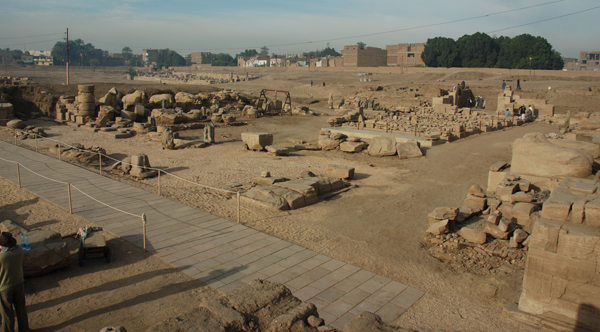
The same area looking southwest from the enclosure wall east of the Precinct entrance. In both photos you can see that we had just completed the first of several mastabas.
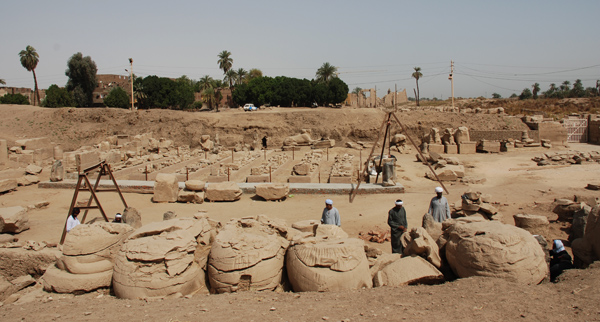
This photo and the one that follows were taken at the very end of the season and show the kind of progress that can be made in just a few weeks when expeditions are able to co-operate to achieve common goals. Again, you are looking north from Mut’s 1st Pylon.
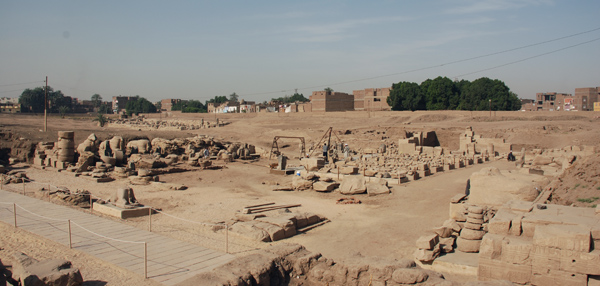
The whole area is now much more organized and easy to get around than it was at the beginning of the season. Here is what was accomplished in the last week of work.
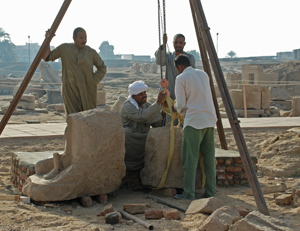
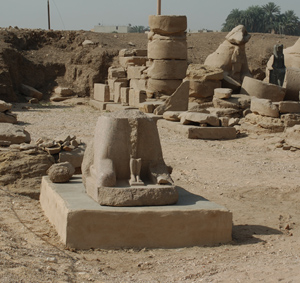
The Taharqa ram going onto its new base (left) and in its final position. Now this important sculpture has an appropriate setting and can be seen clearly by visitors.
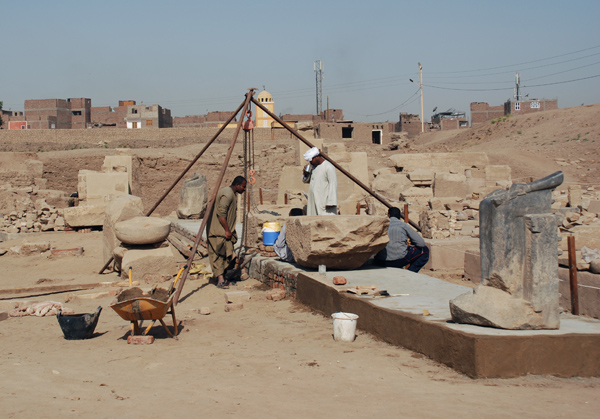
This long mastaba runs along the south side of the main group of mastabas and has been built to hold blocks from temple walls that cannot be put back in place but demonstrate the scale of work undertaken by the ancient Egyptians with minimal technology. Temperatures at the site neared 100° F for most of the last week, making the work even more difficult. Keeping hydrated is important as Mahmoud and his team know. The final blocks were put in place after we left Luxor.
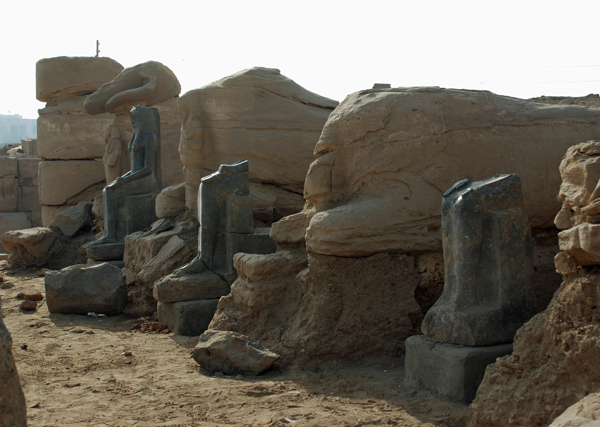
Three Sakhmet statues found between the ram-sphinxes that stand before the west wing of Mut’s 1st Pylon now rest on new bases.
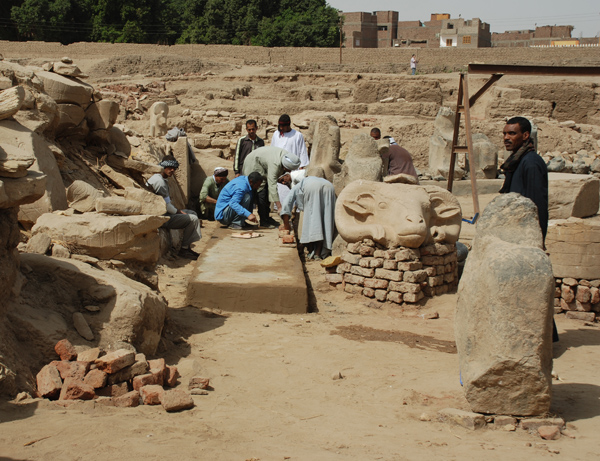
Building the final mastaba, at the west end of the 1st pylon, was still underway when we left the site. When complete and dry, it will hold several fragmentary Sakhmet statues and the beautiful and well-preserved head one of the ram-sphinxes that line this wing of the pylon. It was found by SCA excavators some years ago; unfortunately the sculpture from which it came is too badly deteriorated to allow the head to be put back in its original position.
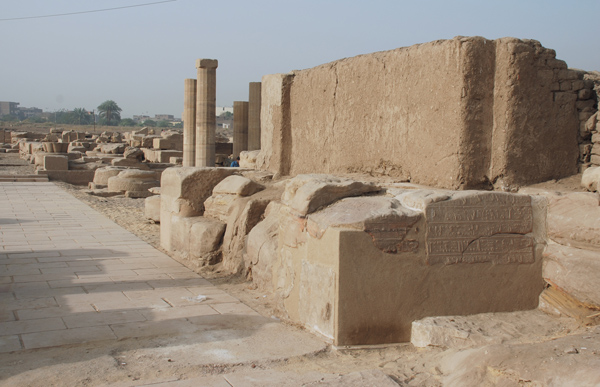
We also finished the restoration of the west wing of the gate in the Mut Temple’s 2nd Pylon. This started as a small project to put two inscribed blocks back in their original position, but the rest of the blocks of this part of the gate were in such poor condition that we ended up consolidating and restoring the whole north end of the structure.
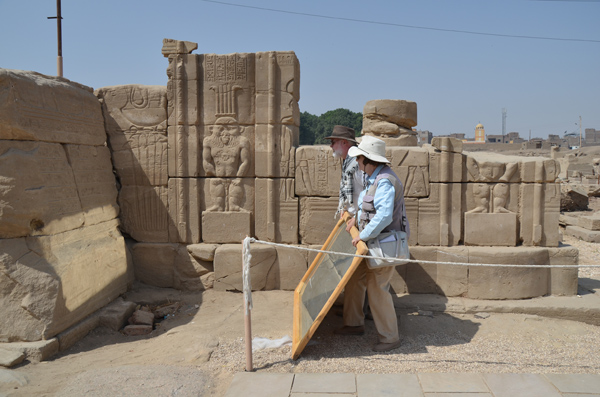
Excavation and restoration are only part of the Expedition’s work. We are also preparing to publish the Ptolemaic religious texts on the gateway in the Mut Temple’s 1st Pylon. To do so, we need good photographs of the inscriptions and reliefs. Sometimes the Egyptian sun provides perfect lighting, as on the reliefs in the background. Other reliefs, though, need reflected light to bring them out. On one of the last days at the site, Jaap and Mary used a large mirror to try to get just the right light on the inscriptions on the north face of the pylon’s west wing.
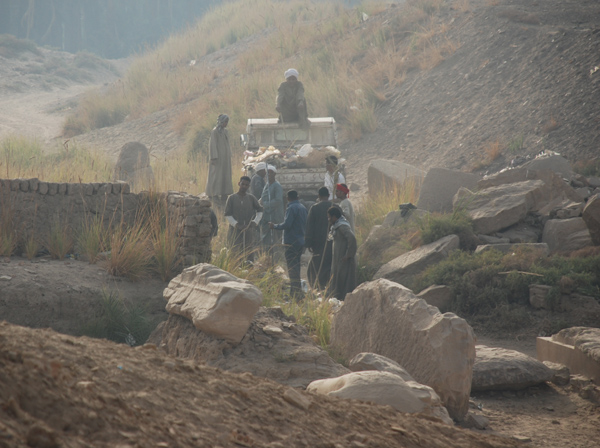
The area just outside the site has become a dumping ground for all sorts of trash. One of our last tasks this season was to arrange to have this trash removed early one morning.
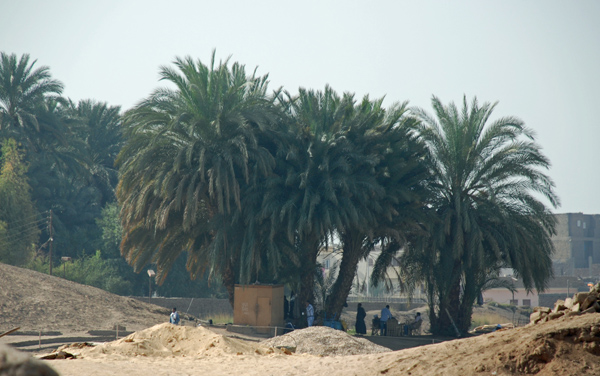
This grove of palm trees is just above the southeast corner of the sacred lake, and is where the pottery is sorted and photographed. It is the only shady area in the whole 22-acre site.
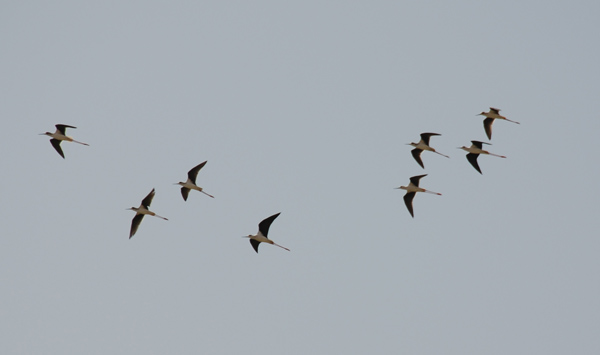
And finally, one last bird shot: a flock of stilts wheeling over Mut’s Sacred Lake. It is hard to leave a place that has such beauty.
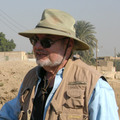
Richard Fazzini joined the museum as Assistant Curator of Egyptian Art in 1969 and served as the Chairman of Egyptian, Classical and Ancient Middle Eastern Art from 1983 until his retirement in June 2006. He is now Curator Emeritus of Egyptian Art, but continues to direct the Brooklyn Museum’s archaeological expedition to the Precinct of the Goddess Mut at South Karnak, a project he initiated in 1976. Richard was responsible for numerous gallery installations and special exhibitions during his 37 years at the museum. An Egyptologist specialized in art history and religious iconography, he has also developed an abiding interest in the West’s ongoing fascination with ancient Egypt, called Egyptomania. Well-published, he has lectured widely in the U.S. and abroad, and served as President of the American Research Center in Egypt, America’s foremost professional organization for Egyptologists.
